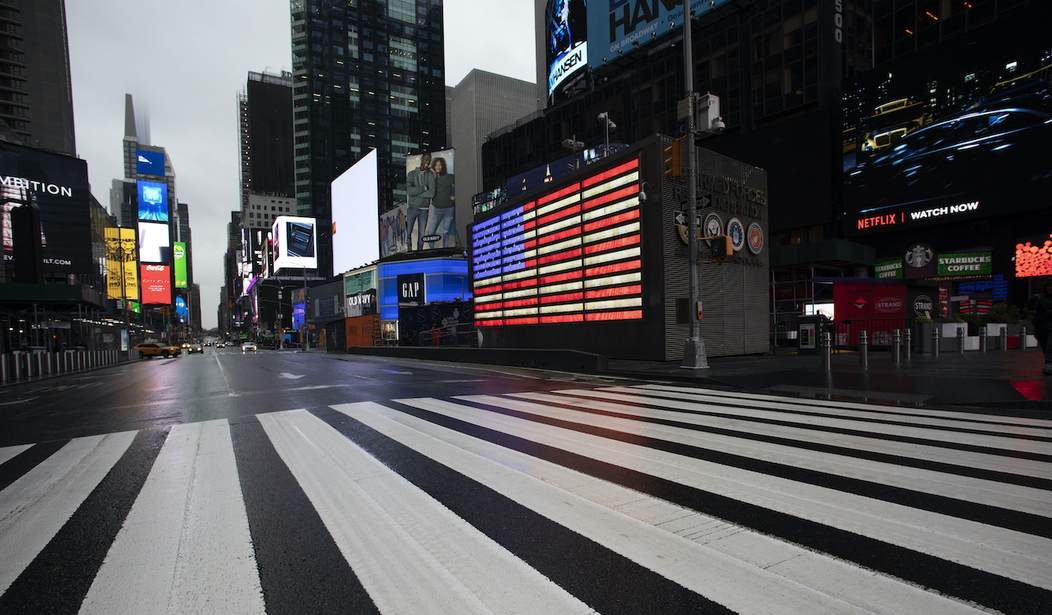With new restrictions on the right to carry set to take effect across New York on Thursday, the New York City Council is trying to figure out just how broadly it can ban the lawful carrying of firearms in Times Square.
Under the new rules rushed into law by Democratic legislators and New York Gov. Kathy Hochul, New York City’s iconic Times Square is considered a “sensitive place” off-limits to concealed carry, but the state law doesn’t define the boundaries of Times Square itself. On Tuesday, council members discussed potential legislation that would place several city blocks beyond the Square itself as part of the designated gun-free zone despite warnings from the Supreme Court in its opinion in New York State Rifle & Pistol Association v. Bruen that declaring most publicly accessible places off-limits to lawful carry won’t withstand constitutional scrutiny.
Times Square is a public thoroughfare, which makes a complete ban on the lawful carrying of firearms problematic enough from a legal perspective, and it sounds like the city council is preparing to move ahead with an expansive definition of the boundaries of Times Square that will be even harder to justify under the standard laid out by the Court.
“Times Square is back to pre-pandemic pedestrian crowding,” Tom Harris, the president of the Times Square Alliance, said during Tuesday’s hearing. “Given the high and continuously growing levels of foot traffic, we appreciate the state’s recognition as a very dense area deserving an extra layer of public safety protection.”
The proposal discussed at the hearing would define Times Square as two adjoining areas of Manhattan, according to a draft of the bill. The first section would be bounded on the west by Eighth Avenue, the south by West 40th Street, the east by Sixth Avenue and the north by West 50th Street. The second would be bounded on the west by Ninth Avenue, the south by West 40th Street, the east by Eighth Avenue and the north by West 48th Street.
The latter portion includes the heavily trafficked Port Authority Bus Terminal.
The proposed boundaries do not include the interior of any building or enclosed structure within Times Square, but the concealed carry of guns inside of buildings or structures within the proposed boundaries could be restricted under other New York laws regulating concealed carry permit areas, according to a draft of the bill. New state gun laws also ban the carry of guns on all private property by default, unless the owner of the property has signage permitting guns or has otherwise expressed consent to guns being permitted.
When attorneys for Gun Owners of America recently argued in federal court that the proposed ban on firearms in Times Square is unconstitutional, they acknowledged that ban might be possible under certain circumstances like New Year’s Eve, when there are both large crowds and a large law enforcement presence that would indicate it is, in fact, a “sensitive place.” But under the proposal discussed today, it doesn’t sound like the city is planning on introducing any special security measures in Times Square that would lead anyone to believe it’s any more “sensitive” than other public streets where lawful carrying isn’t explicitly banned.
The proposed legislation also directs the New York Police Department to enact rules, as needed, in order to implement the bill, according to a draft of the bill. The NYPD will be putting up signage at entryways to Times Square and throughout the designated area.
Individuals who live or work in Times Square can carry guns within Times Square as long as they are moving in a continuous fashion and concealed carrying is legal in the place they are going, according to the draft bill. This rule would also apply to vehicular movement through Times Square.
Rules set by the NYPD will also require individuals who tell police they have a carry license to show it to officers.
… At the hearing, the NYPD said it does not currently plan on creating additional checkpoints or officer details in order to enforce the sensitive location rules in Times Square.
This proposal is unworkable on its face and likely unconstitutional from a legal perspective as well. Consider what Justice Clarence Thomas wrote for the majority in the Bruen opinion when discussing “sensitive places”:
Although we have no occasion to comprehensively define “sensitive places” in this case, we do think respondents err in their attempt to characterize New York’s proper-cause requirement as a “sensitive-place” law. In their view, “sensitive places” where the government may lawfully disarm law-abiding citizens include all “places where people typically congregate and where law-enforcement and other public-safety professionals are presumptively available.”
It is true that people sometimes congregate in “sensitive places,” and it is likewise true that law enforcement professionals are usually presumptively available in those locations. But expanding the category of “sensitive places” simply to all places of public congregation that are not isolated from law enforcement defines the category of “sensitive places” far too broadly. Respondents’ argument would in effect exempt cities from the Second Amendment and would eviscerate the general right to publicly carry arms for self-defense that we discuss in detail below.
New York may not be trying to designate all places of public congregation as “sensitive places,” but there’s also nothing inherently special or sensitive about Times Square other than the fact that it gets a lot of foot traffic and there are a few NYPD officers who can generally be found there. Given that the NYPD doesn’t plan on introducing any special screening measures for those entering the proposed boundaries of Times Square, it’s really hard to argue that the city itself is treating that chunk of the island of Manhattan as a truly “sensitive place”… or that the state’s ban on concealed carry within whatever the city defines as Times Square should be allowed to stand.









